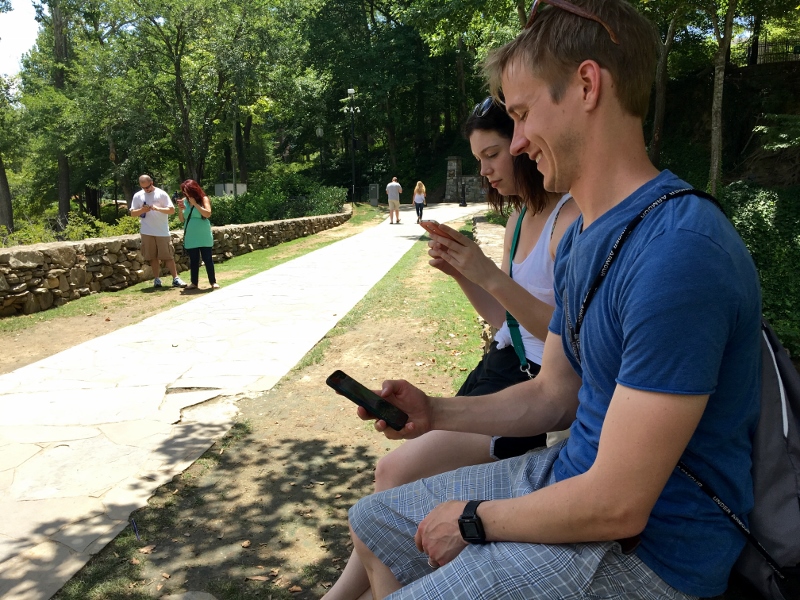The article below was featured on the opinion page of The Greenville News on Friday, July 22, 2016. This link will take you to the article on greenvilleonline.com

Jasmine Smith and her husband, Ryan, were in pursuit of a bright orange Tauros Bull under the Liberty Bridge in Falls Park when I met them last week. The couple, who met on Tinder, had driven from Spartanburg to play the augmented reality game PokemonGo, on downtown Greenville’s Main Street, “where the hunting is better.” Smith, who used Razz Berries to subdue the bull, was excited to be on the hunt. “We‘re usually inside playing alone, but it’s fun to see all the gamers outside together.”
And outside they were. Owing to the vast quantities of PokeStops on Main Street, hundreds of players flocked downtown this week. They could be seen congregating in the Peace Center plaza, clogging the sidewalks, and ambling through Falls Park with their heads buried in their phones.
Like our downtown, the social media world has been upended by PokemonGo. In one week, the game has more daily active users than Snapchat, Tinder or Twitter, and its numbers continue to grow. For those unfamiliar with PokemonGo, the game uses players’ GPS signals to situate them on maps of the world around them. Then, the game adds wayfinding tools, signposts, and gathering places to those maps to allow players to interact with the game in physical spaces. Players use the cameras on their mobile devices to see the colorful assortment of Pokemon characters — toothy bats, big-eyed crabs, bouncing blue radishes, and other colorful digital creatures — moving in and around buildings, dodging cars, and weaving among pedestrians.
The sudden rise of PokemonGo has prompted a polarizing debate about the impact of digital technology on the world around us. On one side, some are choosing to embrace the game and revel in its novelty. PokemonGo is the first geo-locative augmented reality tool to be widely adopted by the general public. It represents a new era not only for games but also for the impact of technology on the world around us.
On the other side, some are choosing to ignore the game and dismiss its novelty. They have shown signs of anger and frustration at the stupidity of “avoiding real life.” Rants on Facebook have criticized players as silly, mindless or wasteful. And some of this reaction is merited. Players have made poor choices about where to play and how to behave, and even walked into danger playing the game, darting into traffic or falling off cliffs.
But as I walked with my family through the park (and, yes, played the game), I noticed not the dangers of distracted walking, but rather a new, beautiful, and decidedly friendly side to our community. Hundreds of players around Falls Park were cheering with each other, laughing and viewing the world through their devices.
As we exercised on the Swamp Rabbit Trail, we ran into players from all walks of life. Paris Saxton and Deon Oliver, both 20, proudly displayed to us the coveted Pikachu — Pokemon’s most recognizable character — that Saxton captured after “playing nonstop” for four days. Around the next bend, we ran into Nathan Ardaiz and three of his co-workers who were on safari during their lunch break. The group planned their day around the best hunting times on the trail. Ardaiz remarked, “I think all this will ultimately bring about world peace.” We shared some laughs and walked on.
Later, I looked back and Ardaiz and his group were sharing stories with Saxton and his friends. And it occurred to me that these two groups of people would likely never have met without PokemonGo. It may not be world peace, but offers us a new view of community — and the impact of technology on it.
Today, augmented reality looks like people in Falls Park hunting for digital bulls. But tomorrow, we may find that augmented reality has the power to add value to our lives, support our individual goals or even bring our community together. The “real world” and the digital world are becoming increasingly intertwined through augmented reality technology, and soon we will all face a choice. We won’t have to decide whether to play or not, but rather how to conduct ourselves when we do.
John A. McArthur, Ph.D., is an associate professor in the Knight School of Communication at Queens University of Charlotte and a Greenville resident. He studies human-computer interactions and is the author of Digital Proxemics: How Technology Shapes the Ways We Move.

Leave a reply to PokemonGo | The McArthur Family Cancel reply